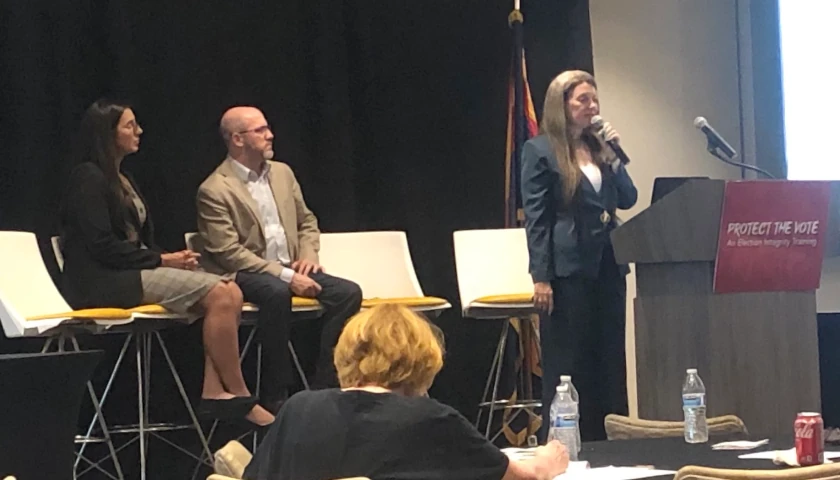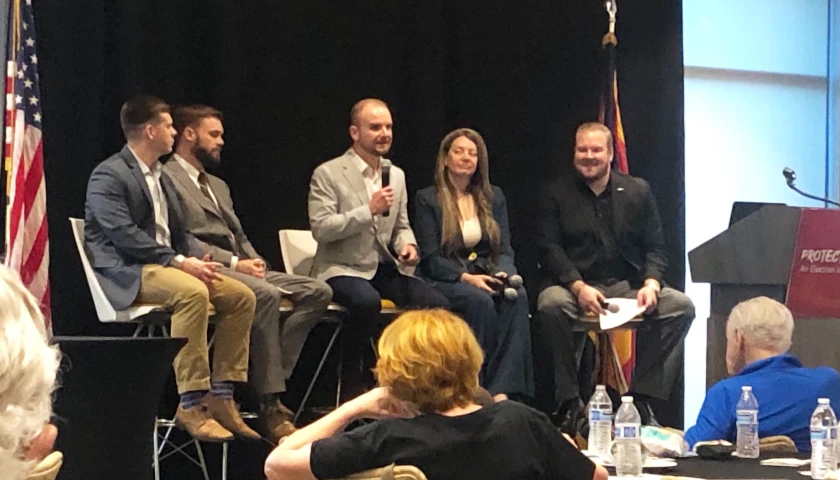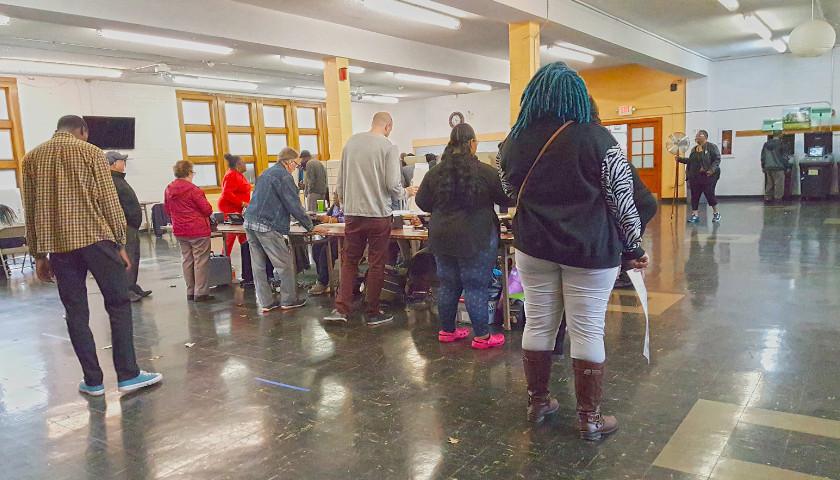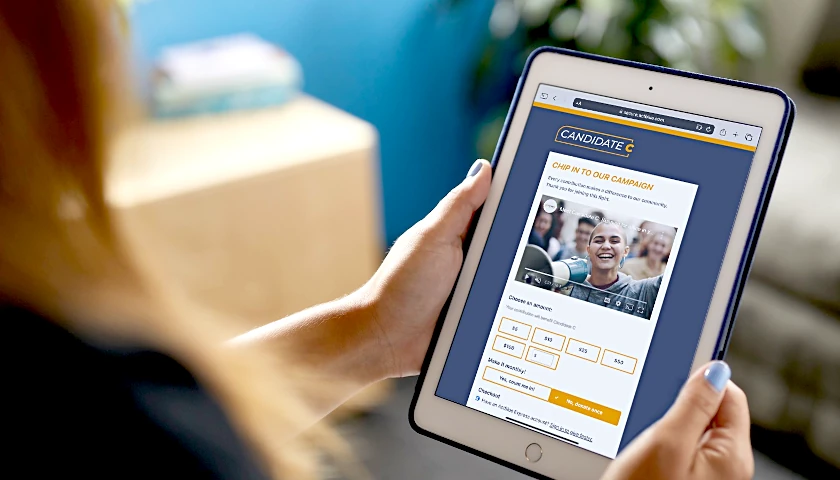SCOTTSDALE, Arizona – Several grassroots groups, including the Voter Reference Foundation run by Arizona Republican Party Chair Gina Swoboda, put on election integrity training in Scottsdale and Tucson on Monday. Organized by America First Policy Institute (AFPI), speakers from the Honest Elections Project, Heritage Action for America, Save Our States Action, and American Constitutional Rights Union Action taught attendees how to work at the polls, observe elections, and educated them on the Ranked Choice Voting (RCV) proposition on the ballot and efforts to require proof of citizenship to register to vote.
Jordan Kittleson, policy director of AFPI, moderated the event, asking the experts questions and commenting on them.
Jason Snead of the Honest Elections Project said the focus of RCV is to “push politics to the Left.” He went over why RCV was nicknamed “jungle primaries” due to all the logistical problems. Snead said the average primary race around the country has 17 candidates. That means there are likely to be 17 separate votes as the candidates get whittled down — voters must come back and vote repeatedly. The way RCV works is that as long as no candidate gets over 50 percent of the vote, the candidate with the least votes gets eliminated in each round of voting.
He talked about “ballot exhaustion,” where voters’ choices of candidates are not counted since those candidates were eliminated in earlier rounds of voting. Snead said RCV is so complicated that the government in New York spent $15 million attempting to explain it to voters. Due to ballot exhaustion, 140,000 votes weren’t counted in the 2021 New York mayoral race, which Democrat Eric Adams ultimately won. Kittleson added that it took six weeks to determine the race’s outcome.
Trent England of Save Our States Action said, “Ranked Choice Voting makes bad election problems worse.” He said in Alameda County, California, after adopting RCV, the government certified the wrong winner in a race.
Nathan Duell of Heritage Action for America said one-third of voters only choose one candidate in RCV, which means they’re more likely to have their ballots not counted due to ballot exhaustion.
Swoboda talked about the Make Elections Fair Act (MEFA), which will be on the ballot in Arizona this fall unless a legal challenge successfully removes it for containing too many subjects. One of Prop. 140’s sections adopt RCV. Swoboda referred to it as “Make Elections Disastrous, Confusing.” She said it is being promoted as creating open primaries, which is misleading since Arizona already has open primaries — independents can choose which party’s ballot to vote in primaries.
She warned that if the Arizona Legislature doesn’t determine the number of candidates, then Democratic Secretary of State Adrian Fontes will get to choose them. Republicans control narrow majorities in both chambers.
Kittleson pointed out that there are 43,000 federal-only voters in Arizona. This means they registered to vote but failed to provide proof of citizenship, so they can only vote in federal races. He said the Arizona Legislature passed HB 2492 to correct the problem, but it has been tied up in litigation. The case is now at the Supreme Court requesting a hold on the trial court’s decision blocking it from going into effect.
Swoboda, who said RCV disenfranchises voters, said that many of the signatures used to get MEFA on the ballot are suspect. She said there are 40,000 duplicate signatures, which the trial court did nothing about. Additionally, Swoboda said the Republican Party has a lawsuit against Fontes over the state’s Election Procedures Manual that is currently on appeal. The NAACP has also said that RCV disenfranchises voters.
England said parts of the country that adopted RCV are now rejecting it. He cited Pierce County, Washington, and Aspen County. He predicted Alaska would be next to repeal it. In progressive Massachusetts, voters rejected it at the polls. England said the movement to adopt RCV is being funded by out-of-state money. Yet he said that proponents campaigned for it in Alaska, claiming that it would eliminate out-of-state money.
Kittleson noted that RCV was brought to the U.S. from England in the 1870s. But by the end of the 1930s, it was repealed in almost all three dozen areas that had adopted it. Another problem with RCV is that the candidate who receives the most votes doesn’t always win. In Maine, he said an incumbent congressman received the most votes in the first round but ended up losing.
Snead discussed how RCV is completely funded by the Left, including progressive billionaire George Soros, but that funding is disguised. He said the movement hires former elected Republican election officials as spokespersons to create the impression it is bipartisan. One of the big funders is a Texas oil billionaire, so people think he is conservative, but he’s not, Snead said. Another wealthy donor is Katherine Gehl, who raised money for former President Barack Obama and inherited her fortune.
Snead warned that RCV is being adopted as part of state constitutions, making it difficult to repeal. He said proponents deliberately conceal its key points, instead creating an impression it’s about opening up primaries. He said they “bank on general dissatisfaction with the two-party system” and try to make the effort look like it’s coming from within a state. England noted that “the more you weaken the parties, the more control the billionaires have.” He said political parties, when they’re properly functioning, are more democratic since they operate from the bottom up. Kittleson pointed out that the Arizona Legislature won’t be able to do anything about RCV for six years if the proposition passes.
Duell said RCV is not an open primary but a jungle primary “prone to errors.” Instead of just one bubble to fill in for a race, there are far more bubbles, so there is more room for error. He said it violates the principle of “one person, one vote.”
Swoboda said a competing measure on the ballot referred to from the Arizona Legislature, Prop. 133, which would prohibit RCV in Arizona, including for political subdivisions. If both propositions pass, she said the one that receives the most votes would be enacted into law. She warned that the ability for political parties to conduct hand counts of ballots after elections would be eliminated with RCV.
Snead dispelled a myth about Virginia Governor Glenn Youngkin getting elected in 2021. He said RCV proponents point to Youngkin’s election and that of the Republicans who won the lieutenant governor and attorney general races in the state as evidence that RCV works. However, Snead said it was a “sleight-of-hand argument.” The three candidates were significantly ahead in each of the nine rounds. Without RCV, they would have easily won their races. He said it was a waste of rounds and caused a lot of needless mass confusion.
Snead said RCV is on the ballot to expand in several states, but he said he believes it may not go through in Nevada, where there are court challenges.
Swoboda discussed efforts in Arizona to require proof of citizenship. She said for 10 years, Republicans have attempted to persuade the Electoral Assistance Commission (EAC) to allow the Arizona voter registration form to state that proof of citizenship is required. When an EAC chair finally agreed, the EAC sued him. Snead said Congress could clear this up.
The last segment of the event covered the logistics of observing or working at elections. Swoboda put on a comprehensive presentation of the dos and don’ts. She explained why 5,000 voters showed up to vote in 2022 and found that their voter registration had been mysteriously changed to counties they didn’t live in, so they were forced to vote in provisional ballots that weren’t counted.
She said then-Secretary of State Katie Hobbs signed a consent decree with the League of Women Voters that let the Department of Motor Vehicles automatically default to updating a voter’s address when they conducted a transaction online, such as registering a vehicle. Unless the voter noticed the check and unchecked it, their address was updated to the address associated with the transaction. For example, if they registered a vehicle in another county, their voting address was switched to that county. Voters who showed up at the polls on Election Day were not allowed to change their address; their only option was to drive to the other county to vote, which was not feasible for most.
She recommended actions that poll observers should take. Swoboda said they should count and compare the number of ballots on the tape printed out at the end of Election Day, the number of ballots, and the number of check-ins. She said observers could be ballot couriers, who trail the ballot transporters around in their vehicles.
Swoboda warned that voters dropping off ballots at the last minute on Election Day will slow down tabulation. Although Republicans have had no success stopping late drop-offs, she said a new bill would stop Maricopa County from merely estimating the number of ballots dropped off.
She went over the ballot harvesting and drop box laws. Although there is a ballot harvesting ban, Swoboda said it has no enforcement mechanism. There is no limit on how many ballots may be dropped off. While someone could legally be dropping off numerous ballots for their family or as a caregiver, she said if someone keeps returning and dropping off batches of ballots, report them to the GOP hotline.
Swoboda said Republicans have had no success getting a voter’s bill of rights passed into law, so poll observers are subject to the instructions of the county recorders, even if that means they have to stand off in a corner and can’t see much.
Jacqueline Doyer, legal policy director for the Honest Elections Project, explained the various options available for working elections. There are three categories. The first is the poll worker, which includes onsite workers and a troubleshooter who drives between locations. The second category is early voters and tabulation. This includes signature verification, special election boards, and curing clerks. The third category is warehouse employees, which includes ballot couriers, hotline representatives, and technical assistance.
Chad Ennis, vice president of the Honest Elections Project, emphasized that poll observers must not take action themselves. “You do not want your name in the newspapers,” he said, pointing out that it hurts the candidates too.
He relayed some problematic election scenarios he encountered in Texas recently. He was part of an effort that audited four large counties in the state. He said at 34 locations in Harris County, the poll books didn’t match the tally of ballots, and it wasn’t just minor differences in numbers. Also in Harris County, 184,000 ballots were lacking a chain of custody. In 14 polling locations, 14 ballot boxes had no origin.
He said that in Dallas County, workers failed to count an entire location with 128 ballots. Also, a box of 318 provisional ballots, which contained 63 valid ballots, was lost in that county. He said it is very important to document how problems are fixed, even more so than documenting the problems.
Swoboda closed by expressing her frustration that county recorders will not tabulate early ballots as they come in. She said it is within their authority, but they refuse. She said State Representative Alex Kolodin (R-Scottsdale), an election attorney, brokered a deal with Maricopa County’s third-party ballot processing vendor, Runbeck Election Systems, so political observers can now observe activities there.
Addressing the upcoming election, she said, “I’ve got all the pleadings, and I’ve got all the lawyers. The thing that’s been missing in the past two cycles is the will to fight, and I promise you, and the seat that I’m in and the party that I’m in, I have the will.” The audience erupted into loud applause.
Interested Arizonans can contact the Arizona Republican Party to find out about opportunities to work at or observe elections. England and Snead co-authored a book last year, “The Case Against Ranked-Choice Voting.”
– – –
Rachel Alexander is a reporter at The Arizona Sun Times and The Star News Network. Follow Rachel on X / Twitter. Email tips to [email protected].






